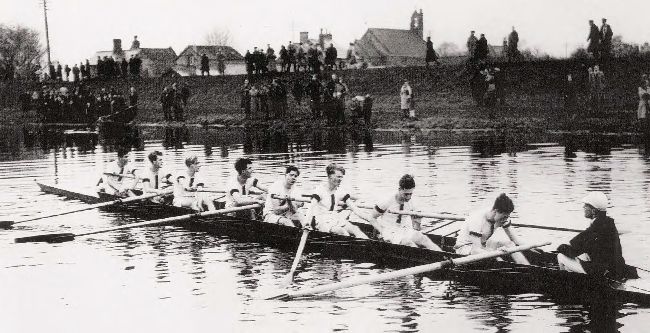HISTORY
Isle of Ely Rowing Club
60 years after the 1944 Boat Race a new rowing club is formed
WORDS / DEREK PICKERSGIL
Back in February 1944, as the country was still in the grip of the Second World War, the Oxford Cambridge Boat Race took place on a one and a half mile stretch of the River Great Ouse in Ely.
Fast forward sixty years to 2004 and the 60th anniversary of the 1944 University Boat Race was celebrated with much cap-doffing enthusiasm by the City of Ely. This eagerness to commemorate an event for a privileged elite prompted a few stroppy local egalitarians to question the lack of rowing opportunities for ordinary folk. The result was the formation of the Isle of Ely Rowing Club. Its light and dark blue colours commemorate the Boat Race connection.

OUBC at the finish in 1944
CREDIT / THE ISLE OF ELY ROWING CLUB
Despite being an upstart on water previously the preserve of Cambridge University and King’s Ely, we were given full support by both Cambridge and King’s. Encouragement also came from two surviving oarsmen from the 1944 Ely race namely Martin Whitworth (No. 4 in the Cambridge boat) and Michael Brooks (No. 3 in the Oxford boat). Both men took a keen interest in our development and Martin was our president up until his death in 2015.
From the start our philosophy has been to give Joe Public and local state school pupils the opportunity to use one of the best stretches of rowing water in the UK, and as we celebrate the club’s first 17 years, our membership – with ages ranging from 12 to 80 – has grown to 150+ of which more than half are women.
In addition to encouraging competitive and recreational rowing we run learn to row courses, organise early morning sessions for state school pupils and offer rowing as therapeutic exercise for people with brain injuries. We host two events on the national rowing calendar, the Ely Head Race and the Great Ouse Marathon run over 22km. Both these events attract rowers from all over the UK.
All this is done from very basic facilities: two portacabins and two shipping containers. Scope for improvement is limited since any grant funding requires freehold ownership of the site or a very much longer lease, neither of which is available. The search for a permanent home continues. But even if a new site is found, we face the prospect of crippling environmental mitigation charges. A similar problem befell Cambridge’s own boathouse project even though the land had previously been a dumping ground for river waste.
Whilst our main message to the reader of this article is that new members will find a very warm welcome here at the club, we also make a plea for national and local government agencies to be more proactive in reducing unreasonable barriers to the use of natural resources for healthy recreation.